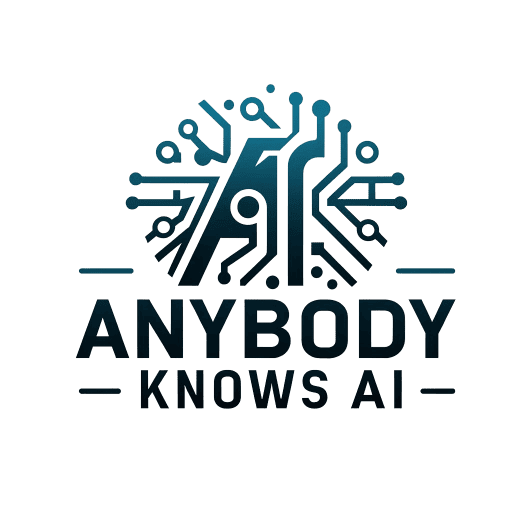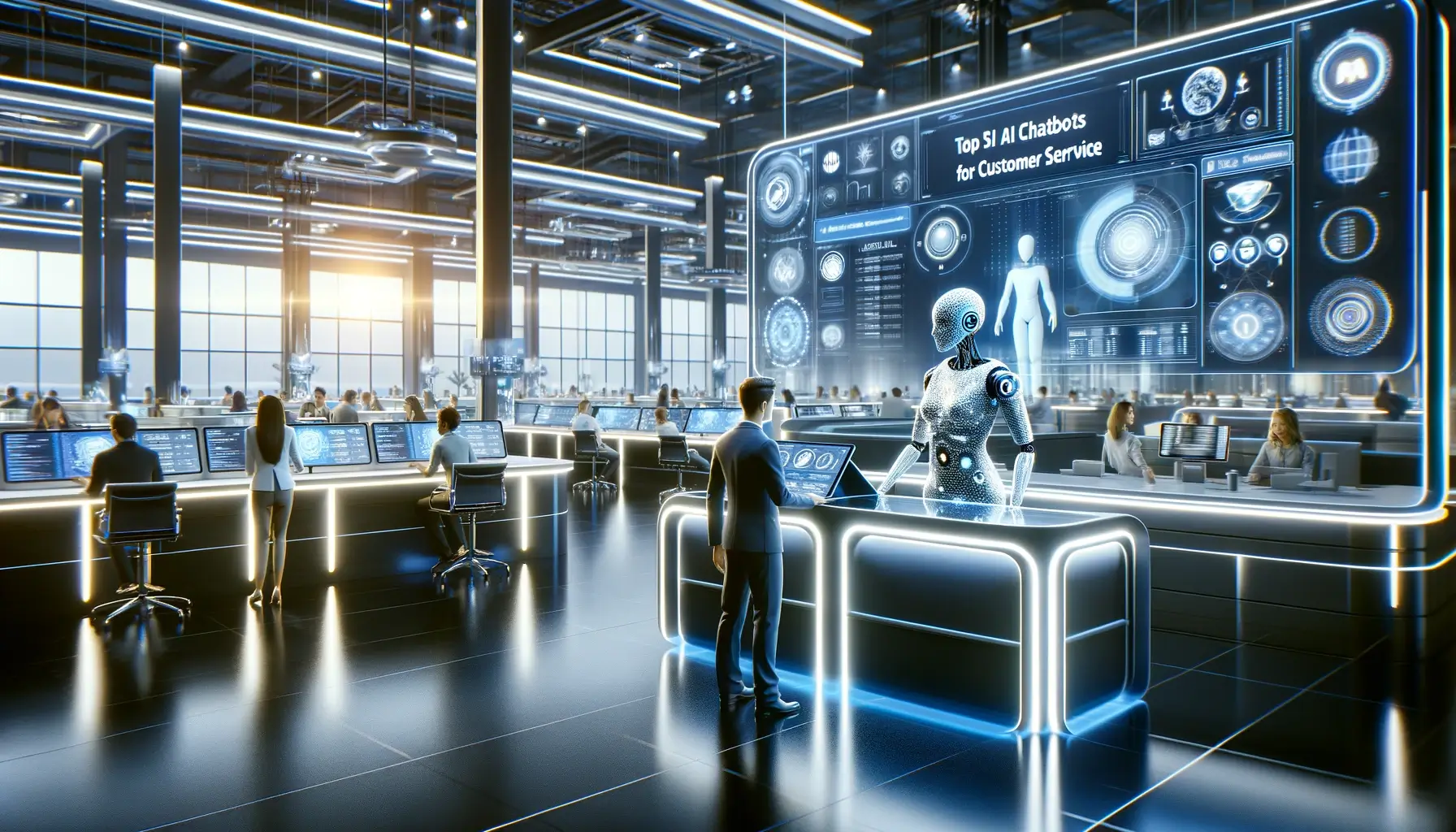In the search for the best AI chatbots for customer service, efficiency and reliability are paramount. This article cuts through the noise, delivering a rundown of the top AI chatbots that excel in these areas. You’ll discover what sets these chatbots apart and how they could make a real difference to your customer service – without drowning in buzzwords or overselling.
Key Takeaways
- AI chatbots significantly enhance customer service by providing rapid, 24/7 support, handling routine requests efficiently, and delivering personalized experiences tailored to individual preferences.
- The industry is witnessing advancements in natural language processing and integration with emerging technologies. AI chatbots are becoming increasingly human-like in their interactions and can provide multilingual and omnichannel support.
- Beyond customer engagement, AI chatbots are valuable for direct user feedback, data analysis, and improving business processes, leading to reduced operating costs and enriched customer experiences.
Exploring the Top AI Chatbots for Customer Service
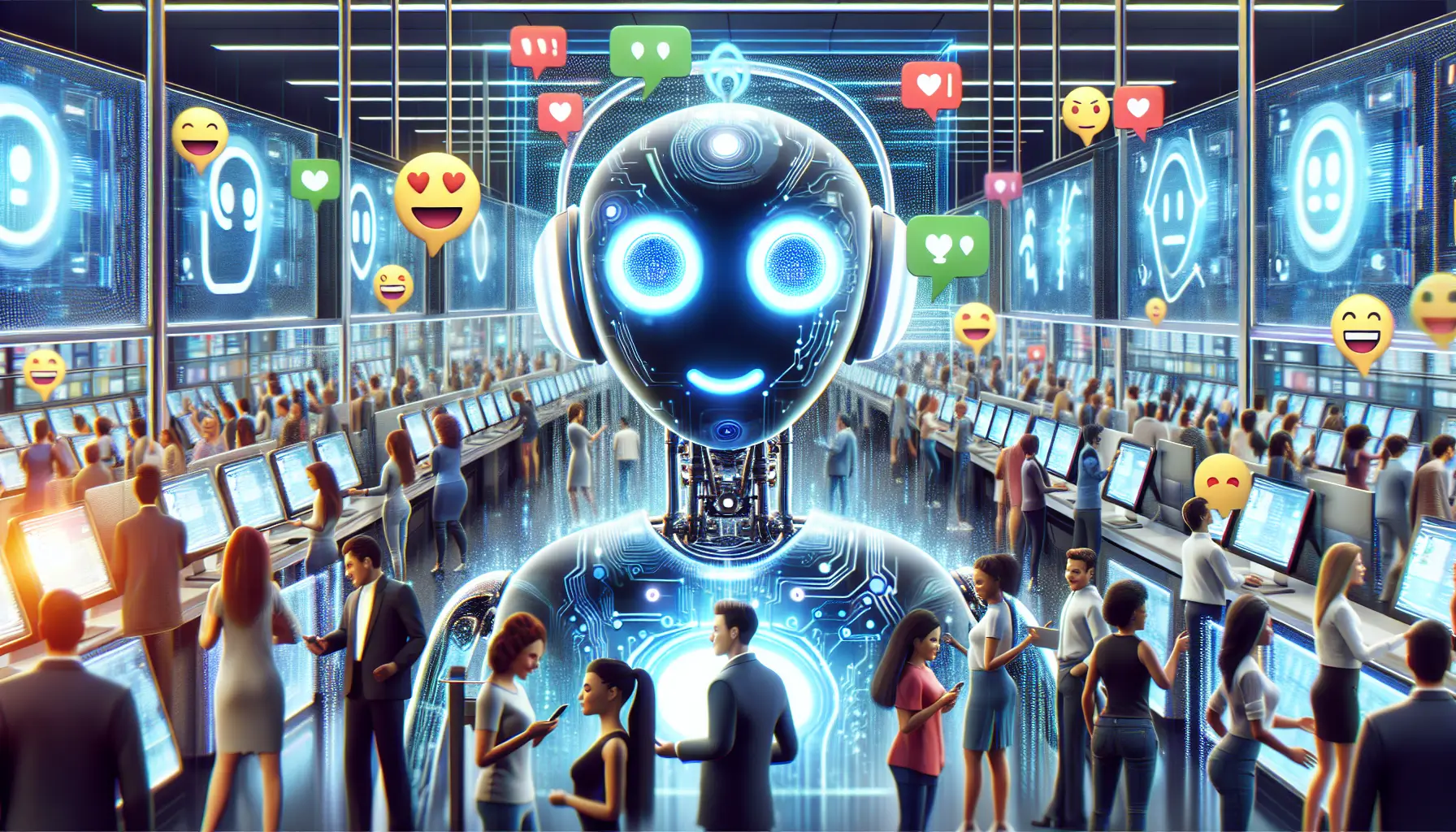
In the realm of customer service, AI-powered chatbots have emerged as game-changers. Offering faster, efficient, and personalized support, these chatbots revolutionize customer service processes, ensuring that all customer requests and queries are promptly addressed and exceptional customer experiences are consistently delivered through a customer service chatbot.
Comprehensive chatbot builders like HubSpot, industry-specific NLU models like Haptik, and no-code platforms like Chatfuel lead the charge in customer services. These AI chatbots for customer service are designed to cater to modern customer service needs, from booking meetings and lead qualification to providing 24/7 support for customer service teams.
Other noteworthy solutions include Zendesk’s AI chatbots and DeepConverse, which are known for their advanced features, rapid training capabilities, and round-the-clock support. These innovative platforms exemplify how AI chatbot technology is reshaping customer service operations, enhancing customer engagement, and transforming customer interactions into personalized, human-like conversations.
As AI chatbots evolve and improve, they are poised to handle increasing customer inquiries, providing superior customer service without compromising quality. The result? Increased customer satisfaction, improved customer relationship management, and a revolutionized customer service experience.
The Pioneers of AI Customer Service
The pioneers of AI and AI customer service chatbots have set high standards in the industry, showcasing advanced natural language understanding and processing capabilities. An effective AI customer service chatbot’s foundation lies in its ability to understand and process human language. This capability enables more natural and human-like interactions.
Haptik and boost.ai, known for their sophisticated natural language understanding technologies, have empowered their chatbots to interpret customer queries effectively. These pioneers have significantly reduced misunderstandings and improved overall customer communication, increasing customer satisfaction.
The evolution of customer service AI chatbots over the years is remarkable. Modern solutions have become smarter and more human-like, easily handling complex customer queries and interactions.
The future of AI customer service chatbots looks promising, with further enhancements in natural language processing on the horizon.
The Rising Stars in AI Customer Support
The world of AI customer support is witnessing the rise of innovative chatbots and mobile apps transforming customer interactions. These rising stars are revolutionizing customer support through machine learning, offering unique solutions to answer customer questions and meet their needs.
One of these rising stars is the HelpCrunch chatbot, which features an advanced, code-free editor for seamless integration, agent tagging, and assigning, as well as a knowledge base integration that collects vital customer details. Similarly, Zoho SalesIQ supports customers by answering FAQs and offering shopping recommendations, creating a superior customer service experience.
As technology evolves, chatbots are expected to integrate more with emerging technologies like voice assistants and augmented reality. This integration will expand their capabilities in customer support contexts, offering more personalized and efficient customer interactions.
The Game Changers: Multilingual and Omnichannel Support
As businesses serve a global customer base, multilingual support is necessary. AI chatbots providing multilingual support cater to this need, ensuring communication accuracy and effectively handling cultural nuances.
Prominent examples include Haptik chatbots, featuring Linguist Pro, offering over 20 languages, and Freshchat, which allows the bot to learn multiple languages. These solutions are game-changers in customer service, ensuring no customer is left behind due to language barriers.
On the other hand, omnichannel can provide customer support that ensures customers receive a consistent experience across various communication channels. Some platforms that are renowned for their seamless integration with omnichannel capabilities include:
- Zendesk’s AI chatbot provides AI-driven recommendations and robust ticketing across multiple channels, ensuring seamless customer interaction.
- UDESK, which ensures a smooth transition between AI chatbot support and human agents.
- Neople also offers seamless integration with omnichannel capabilities and is considered a game-changer in AI customer service chatbots.
These platforms are excellent options for businesses looking to provide a seamless customer experience across multiple channels.
Enhancing Customer Engagement with AI Chatbots
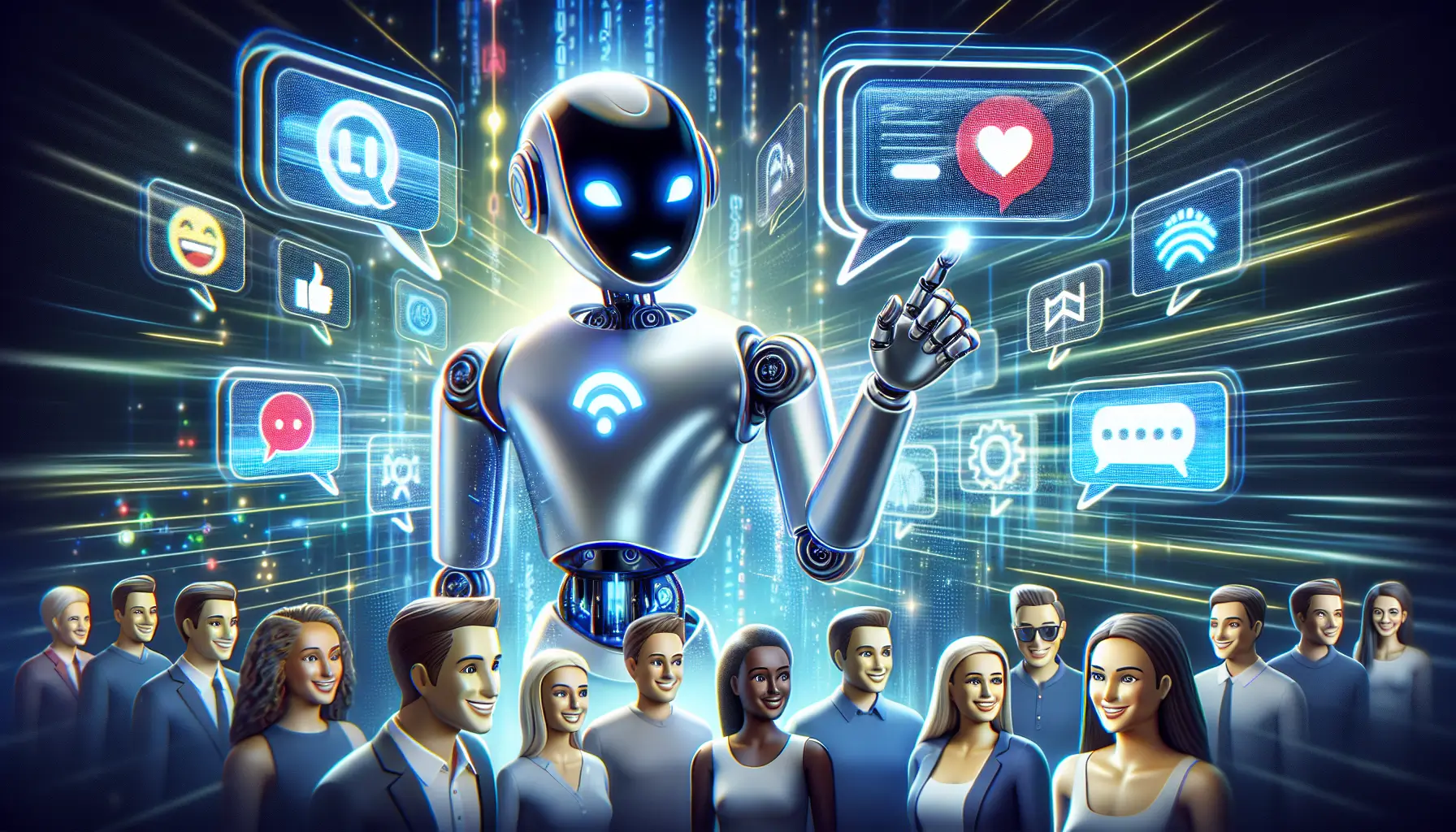
As customer expectations continue to evolve, businesses must keep up. AI chatbots enhance customer engagement by delivering personalized service experiences tailored to individual preferences and past interactions. By offering 24/7 support in multiple languages, AI chatbots are meeting modern customers’ expectations for immediate and accessible service.
AI chatbots offer several benefits, including:
- Identifying communication gaps and tailoring conversations for efficient resolution
- Using visual engagement tools to foster stronger customer relationships
- Delivering consistent, standardized responses
- Using predictive typing features to speed up interactions
These features help deliver exceptional customer experiences and facilitate sustained customer engagement.
As AI chatbots continue to refine their capabilities, the level of compromising service quality and customer engagement they offer will only increase. The future of customer engagement lies in AI chatbots, transforming customer service operations and delivering exceptional customer experiences.
AI Chatbots and the Human Touch: A Synergistic Approach
While AI chatbots are transforming customer service, the human touch remains irreplaceable. The future of customer service lies in the synergistic approach of AI chatbots and human agents working together to deliver exceptional customer service.
AI chatbots handle repetitive and routine tasks, freeing human agents to focus on complex issues that require creativity and empathy. This approach allows businesses to simultaneously manage high volumes of interactions, freeing staff to address more intricate customer needs.
However, maintaining customer trust in AI-driven support systems is crucial. Transparency about chatbots’ capabilities and limitations and strict adherence to privacy regulations are essential.
Streamlining Business Processes with AI Chatbots
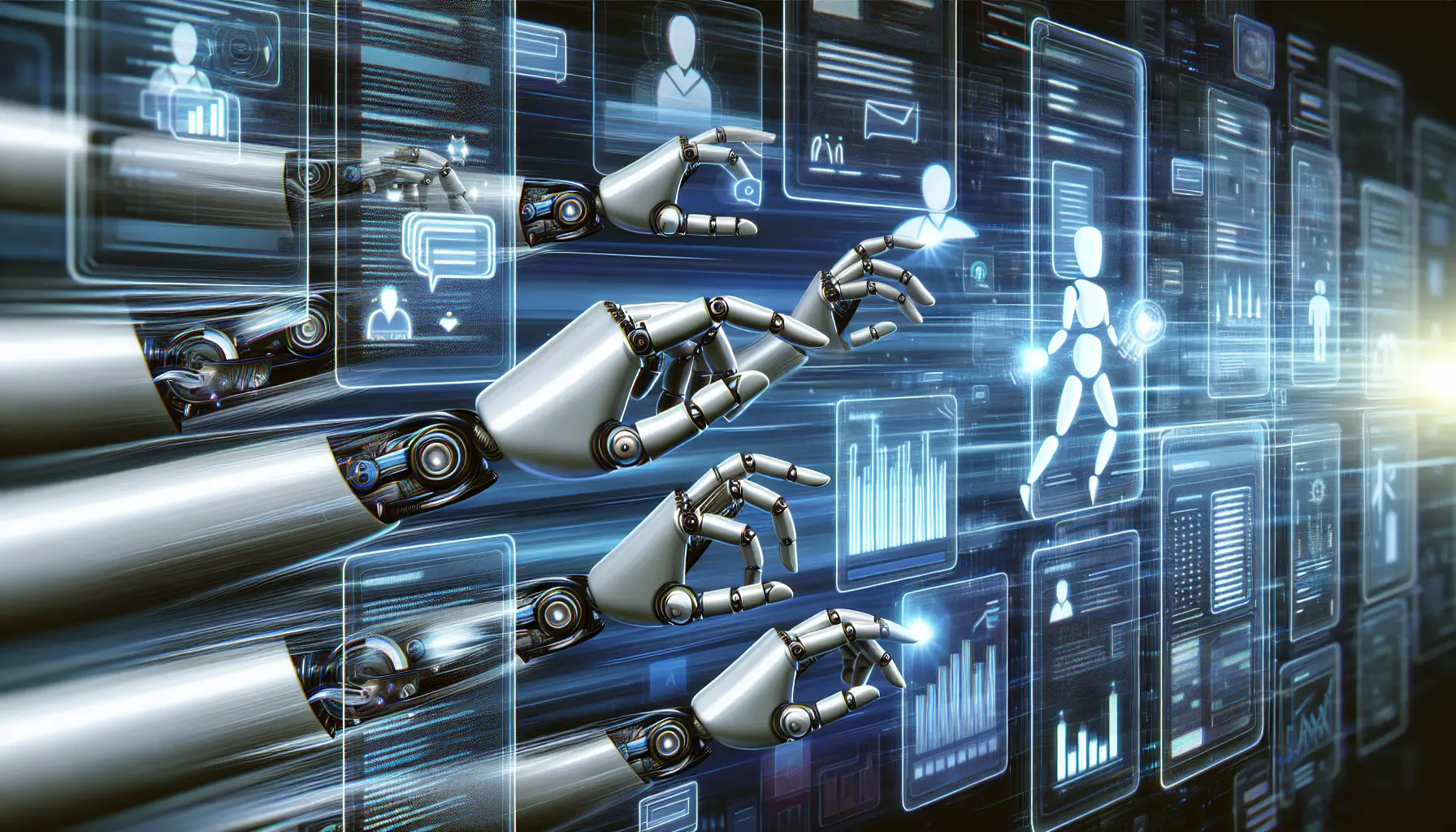
AI chatbots are not just customer service tools but also business tools. By automating various customer service tasks, AI chatbots increase operational efficiency, allowing human agents to focus on more complex issues.
AI chatbots also simultaneously handle high volumes of interactions, freeing staff to address more intricate customer needs. They efficiently handle routine inquiries and automate routine tasks together, significantly reducing the number of queries and lowering the need for human resources.
Beyond customer-facing interactions, AI chatbots also streamline internal business processes such as HR tasks, IT support, and employee training. Companies leveraging chatbots for automating tasks have reported a significant reduction in operating expenses, exceeding 30% in some cases.
By reducing the need to fully staff contact centers with human agents, cutting down interaction times, and providing effective service, utilizing AI chatbots contributes to substantial cost savings.
AI Chatbots’ Role in Direct User Feedback and Data Insights
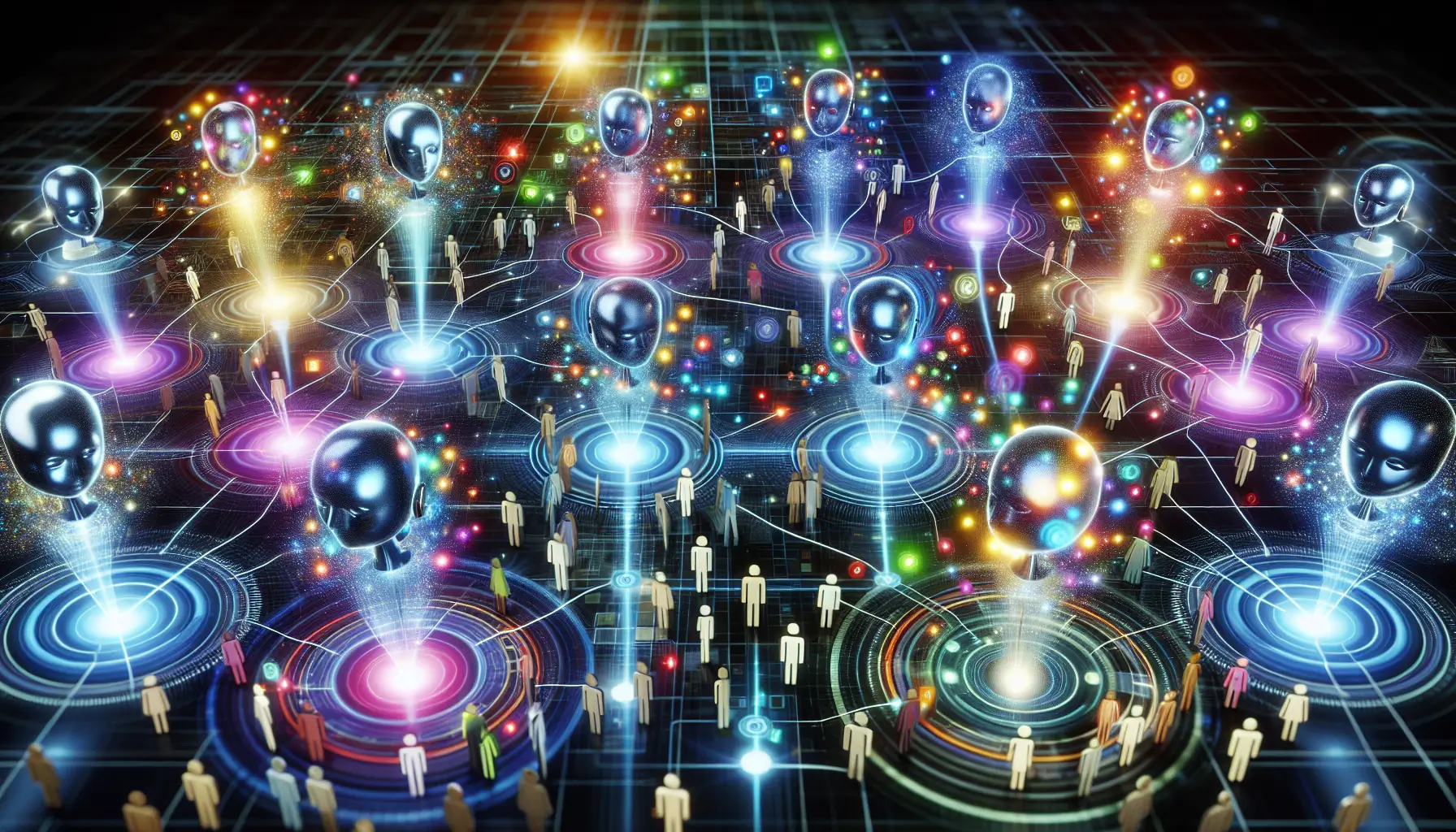
AI chatbots are crucial in gathering direct user and customer feedback and providing valuable data insights. They utilize post-launch interaction data to identify trends and patterns in customer queries, continually refining their training data and functionalities.
Data analyzed from customer interactions helps AI chatbots get consistent responses and pinpoint frequent issues. Utilizing customer data allows businesses to develop targeted self-service content and fine-tune their offerings to boost customer satisfaction.
Machine learning aids AI chatbots in detecting unusual patterns, such as potential fraud. This enhances the security of chatbot interactions and equips live customer service agents and teams with real-time support conversation insights.
Chatbots like Zowie continually evolve their response effectiveness by learning from data points such as historical chats and customer context. This evolution is vital for maintaining high levels of customer satisfaction.
The Impact of AI Chatbots on Customer Satisfaction Levels
AI chatbots have a significant impact on customer satisfaction levels. Offering 24/7 support, they ensure customers receive assistance anytime, greatly enhancing satisfaction rates.
Unsurprisingly, 64% of customers appreciate chatbots’ ability to deliver immediate service needs. Chatbots’ speed and constant availability make them a preferred choice for many customers.
By handling routine requests, AI chatbots offer several benefits:
- Substantially reduce wait times, leading to quick responses to customer queries
- Elevated satisfaction levels
- Provide personalized user experiences by utilizing data from previous interactions for targeted recommendations.
While trust in chatbots compared to human support may be lower, addressing this sentiment is vital for maintaining and improving customer service models and satisfaction. With advancements in AI chatbot technology, we can expect to see a revolutionized customer service experience and increased customer satisfaction levels.
AI Chatbot Technology Across Industries
AI chatbot technology is not limited to a single industry; it’s widespread across various sectors. Some industries that are benefiting from AI chatbots include:
- Finance
- E-commerce
- Retail
- Telecommunications
Artificial intelligence chatbots are revolutionizing how businesses interact with customers in these industries.
In the beauty industry, Sephora’s chatbot serves as a beauty advisor, while in fashion retail, H&M’s virtual assistant provides fashion advice, suggesting items based on user preferences. These chatbots showcase how AI technology can cater to individual customer needs effectively.
AI-powered chatbots are also poised to become crucial in interacting with IoT devices, enhancing the smart device experience. They aid in HR functions such as employee onboarding and training and provide comprehensive solutions for e-commerce businesses, including inventory management.
Integrating AI Chatbots into Existing Business Systems
Integrating AI chatbots into existing business systems ensures seamless operation and minimal disruption. When selecting a used chatbot for customer service, businesses should consider several factors, including:
- functionality
- capacity for integration with current systems
- customization options
- scalability
- cost
Mapping the chatbot’s role in current business processes and identifying points for user interaction guides the integration process. This ensures that the selected chatbot aligns with business needs and technical capabilities.
AI chatbots should be integrated with CRM, customer service software, and other channels. This provides a cohesive and seamless experience for users across multiple communication channels. After integrating AI chatbots into business systems, continuously monitoring and optimizing chatbot performance is crucial. This ensures consistently improved interaction accuracy and customer satisfaction.
AI Chatbots: More Than Just Answering Customer Questions
AI chatbots do more than answer customer questions. They contribute to sales optimization by automating activities like lead generation and suggesting upselling opportunities. These chatbots guide customers to relevant products on a website, streamlining their shopping journey and improving the experience.
Chatbots also facilitate efficient order placement and booking services. Domino’s conversational chatbot for meal ordering is just one example of how AI chatbots transform the customer experience.
AI chatbots can proactively initiate conversations and provide personalized support. These capabilities are crucial in enhancing the customer service experience and delivering superior customer service.
Personalization at Scale: AI Chatbots Crafting Unique Customer Experiences
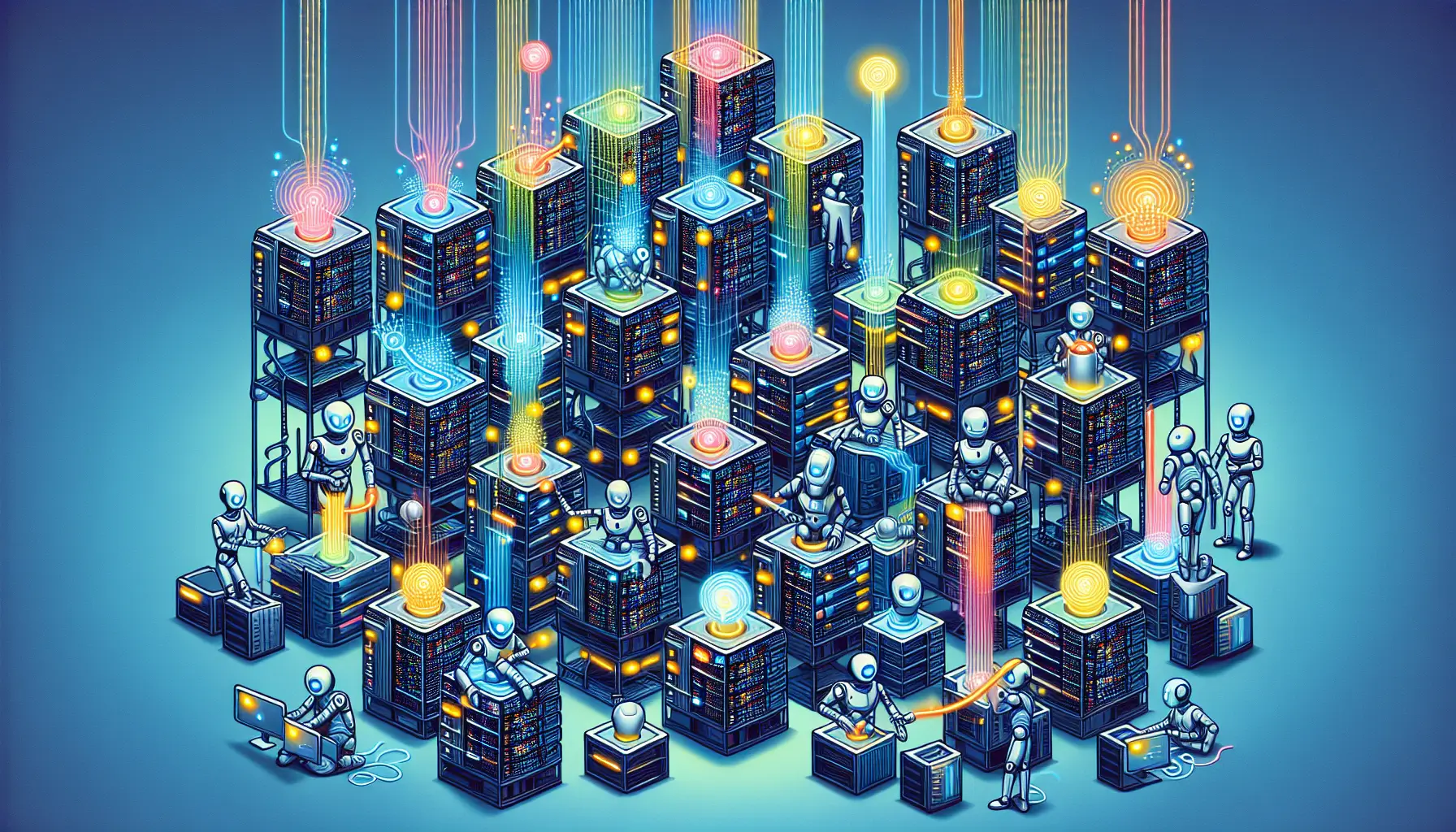
One of the biggest advantages of AI chatbots is their ability to offer personalization at scale. Advanced AI chatbots employ machine learning to enhance customer interactions, allowing them to learn from each conversation and improve personalization over time.
Chatbots offer personalized user experiences by utilizing data from previous interactions for targeted recommendations. By analyzing a user’s past behavior and preferences, they craft unique customer experiences.
Chatbots are programmed to handle tasks aligned with customer preferences and automate tasks, including:
- suggesting related products or services that match past interests
- offering more targeted assistance
- segmenting users into specific groups based on their behaviors and preferences.
By leveraging system integrations, advanced data retrieval, and LLMs’ progress, conversational AI for customer service offers more personalized experiences. Netomi and ChatBot are just a few examples of AI chatbots that provide highly personalized customer service interactions at scale.
Alternate featured table of the top 10 AI chatbots for customer service in 2024, highlighting their key features and pricing:
| Rank | Chatbot | Features | Pricing Model | Trial Period |
|---|---|---|---|---|
| 1 | Freshchat | Multilingual, sentiment analysis, intent detection, chatbot analytics, major integrations | Free for up to 100 agents; contact for paid plans | 21-day free trial |
| 2 | Ultimate | Support in 109 languages, personalized customer experiences, no-code platform | Contact Ultimate for pricing details | Not specified |
| 3 | Zendesk Bots | Easy setup, instant answers 24/7, integrates with Zendesk suite | Starts at $55 per agent/month | 14-day free trial |
| 4 | Netomi | AI-powered, rich messaging capabilities, integrations with CX platforms | Contact Netomi for pricing details | Not specified |
| 5 | Zowie | Customizable, integrates with multiple channels, built for scalability | Contact Zowie for pricing details | Not specified |
| 6 | Intercom | Swift setup, comprehensive customization options, robust performance | Starts from a higher price point, specifics not provided | Not specified |
| 7 | Dixa | Personalized interactions across multiple channels, seamless transitions between channels | Starts at $99 per agent/month | Not specified |
| 8 | Chatfuel | Easy to use, customizable templates, supports various platforms | Contact for pricing details | Not specified |
| 9 | Drift | Real-time personalized interactions, customizable conversational flows, efficient meeting scheduling | Contact Drift for pricing details | Not specified |
| 10 | Zoho Desk | Omnichannel service, multi-brand help center, generative AI, service level agreements | Ranges from $9 to $50 per user/month, depending on the plan | Free trial available |
These chatbots offer a variety of tools and functionalities tailored to enhancing customer service through automated and AI-powered interactions. The specifics of their offerings, such as integrations, language support, and customization capabilities, vary, catering to different business needs from startups to large enterprises. Most offer a trial period to test their abilities before committing to a payment plan.
For more detailed information and to make an informed decision based on your specific business needs, you may want to visit the official websites of these chatbots or contact their sales teams directly.
Overview
AI chatbots are revolutionizing the customer service industry, offering faster, more efficient, and more personalized support. With the ability to handle multiple customer interactions simultaneously, they are transforming customer service operations and delivering exceptional customer experiences.
These chatbots are not limited to a single industry but are widespread across various sectors. From finance to e-commerce, retail to telecommunications, AI chatbots are revolutionizing how businesses interact with customers.
While AI chatbots are transforming customer service, the human touch remains irreplaceable. The future of customer service lies in the synergistic approach of AI chatbots and human agents working together to deliver exceptional customer service.
As technology evolves, chatbots are expected to integrate more with emerging technologies like voice assistants and augmented reality. This integration will expand their capabilities in customer support contexts, offering more personalized and efficient customer interactions.
Frequently Asked Questions
What are some examples of AI chatbots in customer service?
Some examples of AI chatbots in customer service include HubSpot, Haptik, Chatfuel, Zendesk’s AI chatbots, and DeepConverse. These platforms are widely used to enhance customer support and interaction.
How are AI chatbots enhancing customer engagement?
AI chatbots enhance customer engagement by delivering personalized experiences and providing 24/7 support in multiple languages, increasing customer satisfaction and interaction.
How do AI chatbots and human agents work together in customer service?
AI chatbots handle repetitive tasks, allowing human agents to focus on complex issues that require creativity and empathy, which ultimately helps businesses manage high volumes of interactions simultaneously.
How are AI chatbots integrated into existing business systems?
AI chatbots are integrated into existing business systems by mapping their role in current processes and identifying points for user interaction. It is crucial to incorporate them with CRM, customer service software, and other customer service channels.
How do AI chatbots offer personalization at scale?
AI chatbots offer personalization at scale by utilizing machine learning to enhance customer interactions. They learn from each human conversation and improve personalization over time, offering personalized user experiences by using data from previous interactions for targeted recommendations.
